Member Insights
Your Responses to FSAEs Question of the Week
Member Insights Powered by PropFuel
Thanks for participating! Have a question you want to ask other members? Let us know.
We will be sharing these poll responses through future Questions of the Week, so stay tuned and keep responding :)
If last week's question isn't up yet, it it will be. This part is manual. Thanks for your patience!
To what extent is your association currently implementing Generative Engine Optimization (GEO) or Artificial Intelligence Optimization (AIO) strategies?
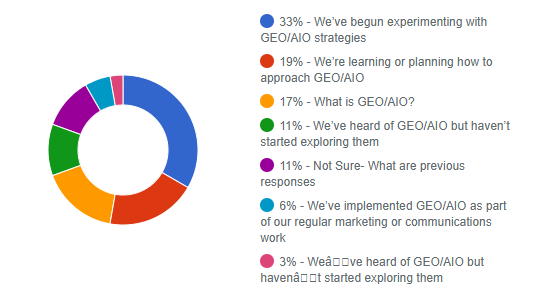 36 Responses
36 Responses
33% - We’ve begun experimenting with GEO/AIO strategies
19% - We’re learning or planning how to approach GEO/AIO
17% - What is GEO/AIO?
11% - We’ve heard of GEO/AIO but haven’t started exploring them
11% - Not Sure- What are previous responses
6% - We’ve implemented GEO/AIO as part of our regular marketing or communications work
3% - We've heard of GEO/AIO but haven't started exploring them
- We only use AI in our routine work but have not purposely approached any strategy to optimize as of yet. We are still learning all the platforms and the best way to use them.
- Wow - those are new terms to me.
Do you feel there is a decline in engagement and participation with Zoom/Teams meetings?
(Camera's off? Non-response to questions? Disappearing participants during calls/meetings?)
 40 Responses
40 Responses
0% - Not sure - what are previous responses
- I think people are fatigued from meetings that could have been an email, especially when they feel like they are moving at an unsustainable pace. Zoom meetings feel like a necessary time of multitasking.
- Cameras are often off.
- Seems like more so since the pandemic in person engagement seems very difficult. I think members just got use to the remote working.
- For public meetings, most keep their cameras off but we still encourage them to interact and a lot do speak or message. For committee and board meetings, we generally have good participation but multitasking/distraction is a concern.
- We have a range of super-engaged (small core numbers) to hop on the call to see what's going on and never come back. But when we suggest dismantling the group a few always step up to protest, but then STILL do not follow through. We have enough engagement that we are able to fill our committees and task forces, get activity in our core structures and our affiliate groups, (PAC and Foundation), people always answer the calls for volunteers and with our committee orientation, we get greater that average participation and follow through with committees. What is disappointing is that some of the committee members then do not follow through and ATTEND our annual meeting even the planning committee. So, its a mixed bag. We had to decrease our meeting time to every other month because we meet in the evening and staff was sometimes on multiple calls in one night several times a week.
- Our Zoom/Team meetings are usually very productive because everyone is familiar with how they work and most of our meetings have a clear objective, so the attendees have cameras on and they stay engaged. Lots of "chat" in the comments too, which, as the meeting facilitator who's sharing my screen, can be challenging to keep up with the "live" conversation and the "chat" conversation at the same time.
- Boards and Committees still holding strong. It's the roundtable group discussions and learning that folks will listen to - but not engage otherwise.
- We limit the number of zooms and ask everyone to participate with camera on. We feel that by not over using the platform, this is a reasonable request. Our zooms are only replacing previous conference calls. We still have three well attended in person meetings annually.
Previous Questions of the Week:
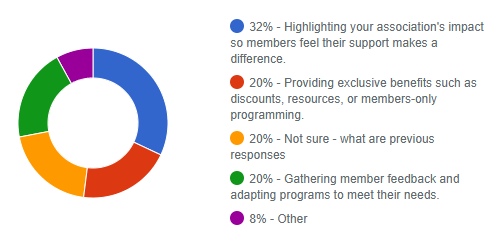
25 Responses
32% - Highlighting your association's impact so members feel their support makes a difference.
20% - Providing exclusive benefits such as discounts, resources, or members-only programming.
20% - Gathering member feedback and adapting programs to meet their needs.
20% - Not sure - what are previous responses
8% - Other
0% - Recognizing and appreciating members publicly through awards, spotlights, or thank-you messages
- Our focus is on marketing association members to the public (their potential clients) as the best in the field. Being a member is a tremendous marketing advantage and our members consistently get the biggest and best clients who are looking to hire the top professionals in the field.
- ALL OF THE ABOVE BUT WE STILL HAVE 50% CHURN. Our Legislative program has the most engagement. Followed by different Special Interest Groups that drive our Agenda. Volunteer opportunities spark enthusiasm and engagement creating
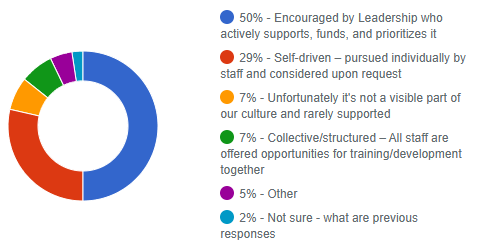 42 Responses
42 Responses
50% - Encouraged by Leadership who actively supports, funds, and prioritizes it
29% - Self-driven – pursued individually by staff and considered upon request
7% - Unfortunately it's not a visible part of our culture and rarely supported
7% - Collective/structured – All staff are offered opportunities for training/development together
5% - Other
2% - Not sure - what are previous responses
- We offer a webinar series, monthly meetings, an annual conference, and regional meetings.
There's nothing intentional or planned, but if someone asks to pursue something, it's generally supported. - Memberships to industry groups evaluated by the team each year and managed by HR. PD funds are a line-item in the budget, and staff request approval for individual events/programs.
- I negotiated a PD budget in my contract. But that does not seem to be the norm and there does not appear to be any much encouragement from leadership to fully pursue professional development.
- I believe it's very visible, encouraged and actively supported, funded and prioritized ... for senior management (directors, VPs and chiefs). But not so much for those in support positions (coordinators, specialists, assistants, etc.). I asked to go to Education Expo, on my own dime and without pay (I am nonexempt/hourly) and was told no.
- Specific individual fund each year (based on position), with opportunities to ask for more if needed for education. Additional leadership roles (like board positions) are funded as well.
- Budget set aside each year and all staff are members of the ASAE group membership. Select staff are FSAE members and we push the QAS2 program to all staff interested.
- Our AMC encourages and budgets team member development. This includes FSAE training opportunities - QAS, conference, etc.
- We budget for it and I encourage and require that all staff engage in professional development throughout the year.

40 Responses
30% - More like 5+ years
23% - Annually
23% - Every 2-3 years
13% - Other
13% - Not sure - what are previous responses
- We review policies much more frequently. It is usually every 3-4 months, but sometimes it is more often.
- As necessary, we’re looking at it this year to include language about remote work and teleworking. Otherwise we’ve been pretty consistent with practicing as it’s written
- 2-3 Years, but sometimes it goes past that. We should put it on a schedule. We did it recently, Made it pretty, added a remote work section and updated our holidays.
- Policy states it should be reviewed every three years, in addition to a compensation study to ensure we remain a competitive in the workplace. I will add that we don't always meet that mark, but we try.
- While annually, there are special circumstances that may require more frequent updates.
- 2-3 Years, we are currently undertaking this process and I would like to see it reviewed more frequently
 92 Responses
92 Responses
32% - 100% Remote
32% - 100% In the office
30% - Split in-office and remote
3% - Other
3% - Not sure - what are other responses
- It's up to the employee whether they want to work in the office full-time or remotely (50/50). Some employees choose 100% in the office; some alternate days in and days remote; and others work half-days in and remote. We've been doing it since we came back after the Covid shutdown and it's worked well.
- It's going great. You have to know if you're a work from home person or a work in the office person and be honest with yourself!
- It's going great.
- We are 2 days in office, 3 days remote. It works extremely well for in-person collaboration while meeting the flexibility needs of our team members. The 2 day in office are decided by team / department.
- Monday, Tuesday, Friday in office Wed, Th remote seems to be going well.
- There are benefits to being in-office as a team, but many of us wish we could find a balanced hybrid set-up. We could be as productive with regular remote day or two.
- We work from home on Mondays. I think it's a great start to the work week.
- Great, we have been remote since 2017
- Punctuality and availability can be an issue. The team has better comradery, compassion, and empathy for each other when in the office. Performance hasn't lagged, but it is difficult to judge whether overall efficiency and performance would improve if in the office full-time as a change of this nature is sure to negatively impact morale - at least for the short term.
- 100% in office, for the Administration/ Accounting
- Split - It works well, we like the flexibility.
- All but one staff are 100% in the office and one staff lives in south Florida and is 100% remote.
- We have a few staff who travel a lot but were otherwise 100% in the office.
- Staff can occasionally WFH, but we're 95% in the office. (We're a local Realtor Association, so most of what we do is in person) We were remote for only a few months in early 2020.
- We have some employees that thrive in the remote environment and others who do not and I question their productivity without supervision such as doing other jobs while they clocked in to this one. Hate to resort to keyboard monitors or such but it is concerning.
- Excellent. If your team is made up of self motivated people, then remote work is great and a money saver.
- We have been remote since 2008 when it was a novel concept. We have given many webinars, breakouts, etc on working remote. We are very intentional about connection and feel like we have a strong culture and perform well for our members.
- We like the hybrid/remote split - best of both worlds. We have set in office days all together for meetings/in person collaboration.
- Mixed bag - but it's the way the world works now, especially with a national organization
- We have 8 staff full time in office and 4 staff fully remote. Those in the office are rarely allowed to work remotely. It's a strange dynamic!
- Our organization (created from a merger of two regional associations) was 100% remote from the beginning (Oct 2019) and it works well!
- This works great for us! Our "office" is really a Professional Development Center that is meant for classes, events, trainings, etc. So the bulk of our time is spent remote.
- 100% Remote - I love the flexibility, plus I travel a decent amount.
- Split - Fabulous. It is a part of our culture that everyone loves and appreciates!
- Work-life balance is important to me and to my employees. Allowing for a hybrid option has given staff an opportunity to be productive on work assignments while allowing them to not be as stressed about home. I don't see us ever returning to fully in office.
- We have two offices - Fort Lauderdale and DC. Both hybrid. The majority of our 31 team members work remotely throughout the country which began prior to COVID. We developed a virtual team culture and communications strategy that has proven to successful serve our 30 plus association clients. This approach has also helped us recruit great talent.
- 100% in Office - We prefer it. More collaborating and bouncing ideas. We like the interaction.
-
We’re a staff of three, two staff members are 100% remote. Our newest staff member works two days remote, with the possibility of going to 100% remote.
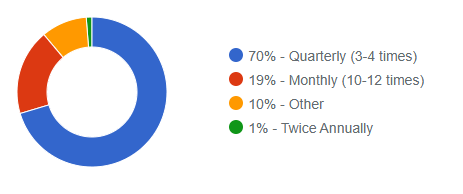
70% - Quarterly (3-4 times)
19% - Monthly (10-12 times)
10% - Other
1% - Twice Annually
How many of these meetings are virtual?

71 Responses
34% - None - all are in-person only
26% - 1-2
18% - Half
12% - Other
10% - All of them
- Several groups meet every 2 months so that financials and changes/responses are quick enough to address. Usually three quarters of them are virtual with 1-2 being in-person surround annual conference or industry event.
- We generally have an in person meeting at our annual conference, but this is separate from the four quarterly board meetings.
- We have found it very beneficial to hold in-person meetings. We add a day or 1/2 day educational content in addition to the board meetings to make it a more engaging event that benefits the members. We also allow them to bring members of their executive teams to aid in encouraging new leaders for their organization as well as ours.
- We schedule 12 and cancel if we have no new business to discuss.
- 1 of the 4 meetings is usually hybrid.
- Our executive committee meets virtually once a month for an hour.
- They are meant to be in-person but 1 to 3 always ask to participate virtually. They can't interact well and really is not a good arrangement. All in person or all virtual is better.
- I would like to go away from virtual meetings.
- Most of the meetings are via zoom. They meet twice a year in person: at our annual conference and another in person meeting six months later.
- every other month, feel likes it's too often...
- We meet monthly. All but the board meeting at conference are virtual.
- Only 1 is scheduled to be virtual and any others that need to be called on an adhoc basis are handled virtually.
- All in person unless there is an issue with travel restrictions on programs or the board decides to call a meeting outside the quarterly meetings for a special vote or to address a challenge.
- We meet 6 times per year.
- 2 in person each year. All other are virtual.
- Usually about 5-6 times a year, but it depends on heat, if anything, is happening legislatively in our industry. We meet only once in person. The others are by zoom (conference calls pre-2020)
- Nine virtual and three face-to-face
- 3 are virtual. One is in person at our annual conference.
- 2 in person - all others are virtual
- Meet monthly. 2 in person and 10 virtual.
 43 Responses
43 Responses67% - Private / Members-Only Access
26% - Member Listings are a Benefit - Public / Open to Everyone
7% - Other
- Ours is public to serve as a marketing resource. Anyone going to our website can find a qualified provider in their area from our membership directory.
- It is only open to members as a benefit of membership
- Our association uses a spreadsheet to track members and does not maintain a membership directory to share.
- There was a public facing directory - that listed individual name, business name and perhaps location (great for confirming membership for govt bids or researching companies). But you had to log in/be a member in order to have access to phone/e-mail of individuals.
- We’ve had website scraper bots in the past so all member contact information is behind a member login wall.
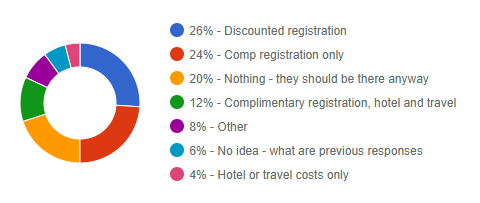 50 Responses
50 Responses
26% - Discounted registration
24% - Comp registration only
20% - Nothing - they should be there anyway
12% - Complimentary registration, hotel and travel
8% - Other
6% - No idea - what are previous responses
4% - Hotel or travel costs only
- Most of the speakers are experts in the field and attend for free, the discounted registration is if they want to attend the Full Program with access to the food events.
- We generally provide complimentary registration, but this has varied over the years.
- At times it has been discounted registration or the 'nothing - they will be there' thought process.
- At our annual conference, we offer all of our speakers complimentary registration whether they're a member or not. For some speakers, generally outside our area/more broadly known, we may also pay a fee and/or hotel/travel expenses, but that's case-by-case, not automatic.
- We are not a member-based association. We pay them for their session and all travel related expenses.
- We also pay an honorarium if the presentation is an hour or longer
- Speakers for General Sessions are treated a little differently, and usually get a free registration and sometimes we pay for travel costs. But, for breakout sessions, we do NOT give them anything.
- All speakers receive comp registrations! If we do a panel, speakers may receive a slightly discounted rate (25-50% off). We generally only have a budget to provide 1-2 Keynotes honorarium or to cover travel/hotel fees. If we don't that year - then we provide a trade with an exhibit booth.
- We work with members that need assistance, but as a rule don't offer perks for speaking
33 Responses
39% - No, we have never offered affinity programs
15% - Not sure - what are previous responses
12% - Yes, we offer multiple programs but they are not well-utilized
9% - Yes, we offer multiple programs and they are well utilized by members
9% - We offer one or two programs and they are utilized by members
9% - Not anymore - we terminated previous affinity programs
6% - Other
-
We offer online training through our LMS, energy purchasing and business insurance.
-
Sometimes it is difficult to measure the success of affinity programs because of not receiving usage data. Programs tend to fade out because they are not monitored and promoted over time.
-
We've mostly moved away from affinity programs, but our national counterpart has a for-profit related organization that offers them to our members.
-
We don't have affinity programs but want to start offering some
-
They are all the same; Hertz/1800Flowers/Tires etc....
-
Their companies all offer similar benefits. It's hard to get members to engage with the same old/same old. How do I find meatier packages
43 Responses
53% - No, we just contract with an attorney when needed
26% - Yes, but our General Counsel is on contract – not an employee
14% - Yes, we have a General Counsel on staff
7% - Other
-
In the 13 years I've been with the Association, we only needed to contract one time with an attorney.
-
We use the same attorney, but it is on an "as needed" basis.
-
One of our executive officers is an attorney but we contract for specific expertise when needed
-
Our attorney is used on as needed basis - not necessarily a contact but use the same attorney
-
We contract with a firm for our lobbying and if others services are required we consult with attorneys from the same firm.
-
We have an attorney that is experienced in our profession who also serves in the capacity of a corporate attorney when needed.. We offer a benefit that allows questions from a member one a year regarding a workplace issue.
24 Responses
38% - 75% CEO / 25% C-Suite
33% - Not Sure - what are previous responses
13% - 25% CEO / 75% C-Suite or Managers/Administrators or Other
8% - 50% CEO / 50% C-Suite or Managers/Administrators
4% - Something Else
4% - 100% CEOs
-
Voting board members are local government entities.
-
76% CEO/President / 24% C-Suite/EVP/SVP/VP
-
We do not have a requirement that the board member be the CEO or owner. But the majority happen to be. We do require Board candidates that are not the CEO or owner to have a signed affidavit from the CEO or owner as part of their Board application
61 Responses
54% - Yes - Board Members pay full prices
20% - No - the association pays all Board expenses
13% - Other
10% - Board Members pay discounted amounts
3% - Not sure - what are previous responses
-
Board members pay for discounted registration and our organization covers hotel, mileage and meals not provided at the event.
-
We cover hotel for our President and President Elect. All other Board members pay their own expenses.
-
We don't have that type of annual meeting.
-
Board personally or company pays all travel, lodging and food we comp conference reg
-
We cover lodging and travel for the majority of our board of director mem
-
They do not pay for registration, but pay for lodging and travel
-
Board members pay full registration (and other) fees just the same as other members. Plus, they are expected to be active and engaged in the organization.
-
We give Board Members a special offer, not available to the public, to entice them to stay through the Awards Luncheon on the first day of conference. The Board Meeting occurs the day before conference begins.
-
We are a trade association and each of our primary member companies has one representative on our board. The only volunteer-related discount we offer for our events are to those who assist in the development or delivery (speakers) in some way.
-
Board members receive comp registration, but travel expenses are on their own except for President and President-Elect.
-
Executive Committee is reimbursed hotel, mileage. Board pays full price without reimbursements
-
AMC: We see all of the above. But most often I see the board pay full price (no travel reimbursements), but may receive room upgrades. One event comp's guest/spouse registration.
-
They don't pay anything - They are volunteers
-
We pay the registration fee but they pay for all other expenses.
-
President and President Elect only we pay for
-
Our BOD Chairman is comped at some events because they are so busy helping run the meeting. They often don’t get to enjoy your finish our meal, etc.
-
They are volunteers so we cover all expenses.
-
They receive free registration
-
We pay travel expenses if the Board meeting is stand alone and not connected to another membership wide event, like the Annual Conference or Legislative Conference.
-
We pick up the sleeping room for the President, but the board pays all registration fees and travel.
38 Responses
45% - We provide the audit to the Board; members may access it if they ask us for it
29% - Only Board members can access the audit documents
8% - Yes, we provide access to the audit to all members and leadership
8% - Other
8% - Not sure - what are previous responses
3% - We provide audited financial statements only
-
We do not provide our audit reports online. Only PDF to the BOD and in BOD mtg materials.
-
We provide access to our annual audit to all members through the member portal.
-
We do a report out during a session at our annual meeting. The statement of activity is made available to the membership.
58 Responses
66% - No refunds past specific date / we invoice full amount due
19% - Other
12% - Partial refund past specific date / invoice partial amount due
3% - Full refunds allowed - no invoices sent
-
Invoice up front, with partial refund at specific date and no refund after a specific date.
-
Most likely if something is getting Cancelled, just a few days before any of our events, it would have to be some type of catastrophic occurrence, in any event we would have already had expenses incur to set up and run the event, hotels, exhibitors, catering, etc, if refunds were provided it would be on a prorated amount, after these expenses have been deducted, and would be done on a case by case, and would depend on if the event will be rescheduled during that budget year and also if that event qualified to have event cancellation insurance.
-
We have a cancellation policy in place: If one cancels within 2-4 weeks of the event, they get a refund, minus a 25% processing fee. There are no refunds or credits for cancellations within two weeks of an event.
-
No refunds for cancellation less than 30 day prior to event. Refund less $50 admin fee prior to that. Will grant an exception if Candian registrants have to cancel due to travel restrictions.
-
Typically handled on a case-by-case basis, and tracked for misuse.
-
We established the expectation that payment is due with registration but do offer to invoice members when they register. We tell guests or exhibitors who are non-members / new to us that their spot is not confirmed until we receive payment, which helps limit our paying for tables or meals that aren't needed.
We have a formal policy of refunding up to a certain date (typically at least 2-3 weeks before the event because of meal guarantee deadlines) less a 25% fee to offset costs we've already invested (think credit card fees, space reservation). Requests to cancel must be received in writing (email is fine).
After that date, we specifically state that we do not refund and do not refund for non-attendance, which is a good policy for last minute folks. Those who plan late will call and ask if "there's still room", and if I can accommodate them, we do, and we can collect payment on site.
Most of our folks realize that our primary event is a fundraiser and have no problem with having paid and not being able to attend last minute. We have refunded in full only a couple of times, and both were medical emergencies for long-term members. So in short: set the expectation up front, collect up front, and avoid invoicing after the fact if possible, which can leave a bad taste.
-
We allow refunds until about 2 weeks out and charge an admin fee to recoup credit card feest. After that date, no refunds are permitted.
-
within 10 days of the event we have a no refund policy. Almost all vendors have been paid by that time and final arrangements have been made.
-
They pay in full before the event. If they meet deadline they get refund minus a $25 processing fee.
-
No refunds unless the request is accompanied by medical documentation with an excuse that would not allow the attendee to be present at the event.
-
We charge a fee ($25.00- mostly to cover credit card fees) if cancelled prior to a certain time. At about 2 weeks out, no cancellations, only substitutions. However, people mark "pay by check" don't show up, then, don't pay.
-
We take payment in advance for all events. Once a "Seat" has been purchased and taken out of play, there are no refunds
-
A 4-day cancellation policy applies prior to the event, with no refunds after that.
-
Generally we tell attendees that there are no refunds past a certain date. And we enforce that. However, if a situation arises where they do need to cancel and would like a refund, we require that in writing and an explanation as to why. We present this at the board meeting onsite and allow them to review all requests as a group/total financial break. Some years everyone is a yes, some years it's 50/50 based on situations. Sometimes it's 2 requests, sometimes it's 7.
-
We just implemented this policy after a rash of cancellations after critic dates of guarantees to property/facility.
-
Our cancelation policy sets a date for written cancellations (minus a $30 processing fee) before meal counts have to be submitted before an event. Anything received after that date can be transferred to another person or no refunds are provided
-
Generally our events are wait-listed so there is almost always someone to take the registration.
-
We do not offer full refunds, only partial refunds. Many requests we receive are unrelated to the event itself, and staff time has already been allocated to planning the event. Partial refunds are provided on a case-by-case basis.
-
Up until 1 week prior to the event, we offer a refund of fees minus $30 service charge. After that time, no refunds.
57 Responses
75% - We don't get either type
14% - We receive state funds
7% - Other
2% - We receive federal funding
2% - Not sure - what are previous responses
-
We receive grants specific to addressing a required compliance or legislation. No other funding.
-
No. However, some memberships/registrations are paid by Federal/State Employers.
-
No funding at all other than dues revenue and non-dues revenue generated
-
The association does not receive direct funds from the federal or state; however, our members do.
-
We provide services to municipalities, but no grant funding.
-
We don't get either - But how do I get it?? LOL!
-
The state of Florida offers grant funding to educate our members. It's a large part of our annual non-dues revenue.
14 Responses
-
A friend's org partnered with a pet shelter during their conference. The shelter had a booth in org's expo allowing attendees to touch and admire shelter pets. The fundraiser was a pet naming content where attendees could donate money to name the pets. People donated money toward their favorite name. Proceeds were split between the org and the shelter.
-
Two come to mind -- one was when we moved into our new office, we launched a room naming campaign/donor recognition wall. Second was similar but celebrating a milestone anniversary for the organization.
-
We had a pie in the face fundraiser at our trade show where members could pie (whipped cream) their boss, one of the board members and our Executive Director in the face. It was a hit!
-
Pies in the face for volunteers at our circus themed trade show
-
Don't do them, our Annual Conference raises the most money for us
-
Auction
-
Annual Golf Tournament
-
RPAC Auction and Realtor-Builder Trade Show
-
Affinity Programs are our most consistent although they do not bring in the revenue of the past. Our Foundation was founded on the concept of naming funds after people for a $10,000 donation. This was established in 1987 and we still get these endowments today. They are allowed to fund them gradually. We started with $11,000 and now have over $1.6 million for grants and scholarships.
-
Golf Tournament
-
Golf tournament
-
We have 2. We did a cornhole tournament in teams of 6 with 4 rounds at 22 minutes. Teams switched cornhole lanes every 12 minute’s creating great connection. The other was selling tickets to pick 6 winners of autographed shirts, footballs and a helmet of our Keynote Joe Theismann. Broke our record for funds raised.
-
Big Ticket Raffle-$10 for one ticket or $25 for one three tickets
-
Gala honoring a member
44 Responses
25% - 60% buyers/40% sellers
18% - 75% buyers/25% sellers
16% - Not Sure - what are previous responses
14% - 40% buyers/60% sellers
11% - 50% buyers/50% sellers
9% - Other
7% - 25% buyers/75% sellers
-
25% buyers - I would love some suggestions to flip this ratio
-
Our sellers/suppliers are equal to processors, distributors, and brokers in their membership. They pay the same for dues and for event registrations.
-
Ours is more like 90/10 buyers to sellers. We do not do a trade show of any kind, so we tend not to get many sellers.
-
Probably more like 85% buyers to 15% sellers
-
Ours is 66% Buyers, 34% Sellers. In between the last two choices.
-
10% sellers 90% buyers
57 Responses
39% - We don't offer student memberships
28% - We have student members and offer programs/services designed for them
23% - We have student members but no specific programs/services
7% - Other
4% - I'm not sure - what are previous responses
-
We have removed honorary & student memberships.
-
Students are either free or $15 (versus $170 or $120 respectively). No different benefits beyond general membership - but conference registration is heavily discounted to the point where it really is just there to cover their meal fees. We have had individuals take advantage of these heavy discounts and therefore we require documentation of current enrollment/transcripts/etc. Unofficially, we grant up to a year after graduation with this type to allow time for a license to be earned (considering our renewal cycle). Receive very little push-back from those utilizing that membership type.
-
We offer students reduced membership fees and conference rates, as well as offer competitive sponsorships to attend conferences. We hold two conferences a year, and one of the conferences offers a poster competition. Students submit an abstract, and a panel of judges determine which students are awarded complimentary registration to present their work and compete for scholarships. The second conference has a competitive essay-based scholarship. These students are awarded a travel scholarship to attend the conference. Recipients are asked to volunteer five hours while at the event.
-
We are Girl Scouts of West Central Florida! It’s what we do!
-
We offer over 150 different classes for continuing education via a vetted pool of over 235 instructors that our local associations can pull from. In addition, we offer support and education for our Education Directors, state-wide, a Leadership Academy for emerging future volunteer leaders, and additional designations of recognition o support the professional growth journey of our members.
-
We don't have student memberships but we have a strong relationship with the student organization and we offer the first year free to new graduates who belong to their association.
-
We work with the student organization at USF but do not have a student membership at our organization.
-
They are our student doctors and their membership is free during their medical school years. We have a student association on campus. We visit the campus twice a year, once to welcome the incoming freshmen and again to conduct a workshop. We also have a student event (lecture/workshop) for them at both our annual conferences.
-
When students reach out to us, we have made exceptions. We would like to develop a more concerted effort around student outreach/engagement to promote careers in the industry.
-
We don't but I would love to hear what other associations offer.
-
We currently have 576 student memberships. Osteopathic medicine day at the Capitol is 1 event specifically for our students.
-
We have specific on campus events for law students and host a mock trial competition
-
We have a student on our Board. Our Foundation provides student scholarships, we have student posters at our annual and we recognize all schools of pharmacy at our House of Delegates by allowing one voting member as a delegate. Students can also join our councils and committees.
-
We do not have student memberships, however we do use student interns from the FSU (sourcing through both the school of hospitality and the Jim Moran program). We also fund scholarships at all of the law schools in Florida and have scholarships for law students to attend continuing education programs we present.
-
student education track at convention
53 Responses
32% - Yes - we factor in all things to determine true profitability
32% - Sort of - we include some internal expenses but not staff salary or overhead
28% - No - we only include hard costs that are billed/paid out
6% - Not sure - what are previous responses
2% - Other
-
We do not include salary and benefits, but do include expenses, such as travel, staff, hotel, food, etc
-
We actually produce two financial reports. One with the administrative costs and one without. We like to see the true cost of an event with and without the administrative costs.
-
We kind of do both just to show them. We actually had a loss this year due to rescheduling due to hurricane, We are utilizing the cancellation insurance to recoup some of them. Note: make sure your folks cancel in writing because we are having to supply the cancellation emails emails to file the claim.
-
Our event budgets only include direct costs for the event, no overhead or salaries.
-
This is something I am going through right now and would be interested in other's responses. Currently I am excluding staff expenses because we budget for general staff travel.
Have a question you want to ask other members? Let us know.

